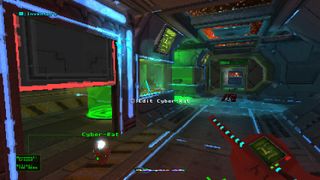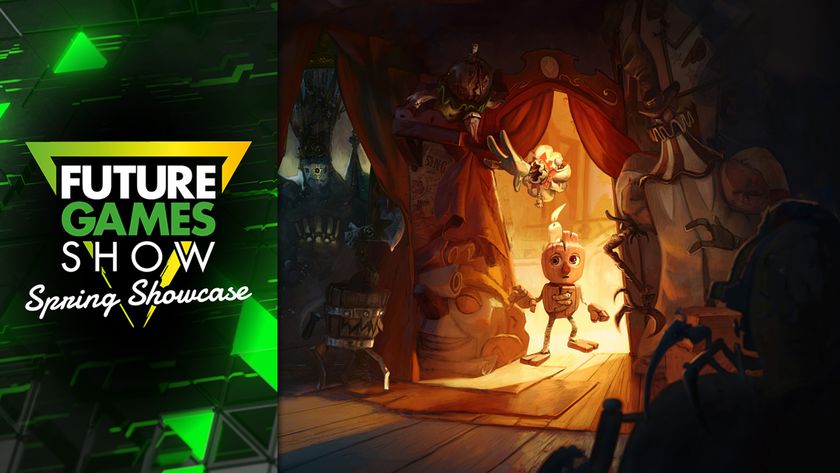A game about a game inside a game: You should be playing The Magic Circle
Explore the inner workings of a game stuck in two decades of development hell, and save it from its own creators
- Format: PC/PS4
- Price: $19.99 / £15.99
- Release date: Out now
A lot can happen in 15 years. A child can go through the entire US public education system with a few years to spare. The internet has gone from screeching dial-up curiosity to a ubiquitous font of information and communication available in our pockets. 15 years is how long it took for Duke Nukem Forever to go from inception to completion, a game which was in development longer than the combined production of the entire Lord of the Rings film trilogy.
That's nothing compared to The Magic Circle, the fictional game-within-the-real-game from egomaniacal superstar developer Ish Gilder, who has spent over two decades in development hell crafting the long-awaited sequel to his beloved 80s-era text adventure. Ish is such a perfectionist and so incapable of making decisions that he eventually decides to undo all the work that had been done up to that point and start over from scratch. None of the environments or textures have color. The weapons? Gone. The boss encounter scripting hasn't worked for years. Placeholder text is everywhere. And the soundtrack is a collection of fits and starts, with the composer mumbling over temp tracks as he tries to decide which song better fits the mood of the scene.
The entire project is a mess, and is no closer to completion now than it was twenty years ago. And as the hero of this unfinished fantasy game, you've decided enough is enough. It's time to finish what the developers clearly can't, and your quest to release this long-awaited game will take you to some surprising and highly meta places.
To do this, you have to navigate through this fascinating sketchbook world and solve a variety of inventive, open-ended puzzles by re-writing the very code of each of the game's enemies and objects. Every single creature you see bouncing along can be trapped and interacted with, its various properties tinkered with and customized to fit whatever situation you need. Monster rushing toward you? Change it so you're one of its allies instead of its enemy, and you now have a faithful companion you can call on to attack enemies for you. The Magic Circle encourages you to get really weird with it, too, as you can make typically stationary rocks fly around and shoot fire, or turn rock turtles into hovering platforms. There are a lot of toys to play with inside The Magic Circle, and many of its puzzles are designed to awaken your inner game designer, forcing you to tackle them in unconventional ways.
As you walk through this broken fantasy environment, you'll notice audio recordings granting you little bits of story along with stat boosts for your newly-acquired minions and notes left by other devs regarding the state of certain levels or AI problems. You'll see the skeleton of a game which, in the hands of a more talented or focused team (like, say, the ones making the actual game you're currently playing), could be something great - or, at the very least, passable, if the developers just finished something. But the more you explore, the more you'll discover about The Magic Circle's long and troubled development cycle, as well as the dark secrets buried inside its code by its creators.

Question, the studio behind the actual game, is made up of ex-Bioshock Infinite developers - a game that went through its own sort of troubled development on the road to release. It's hard not to imagine bits and pieces of their own experience on that title and others seeping into this one, of realizing that as ridiculous as many of The Magic Circle's scenarios and story beats may seem, they're all probably based in some sort of fact. And while The Magic Circle is relatively brief, it's layered with loads of humorous meta-references to the development process, botched video game conference presentations, creepily obsessive fandom, game criticism, and much more. (Bioshock director Ken Levine even voices an HR rep in a few of the audio logs, which probably makes The Magic Circle the most 'meta' game-about-games ever created)
Sign up to the 12DOVE Newsletter
Weekly digests, tales from the communities you love, and more
I don't want to spoil too much, because the joy of The Magic Circle is in figuring out its solutions and piecing together the mystery behind The Magic Circle's development for yourself. But as much as it's a satire of game development (especially those games that find themselves stuck in development hell), it's also about giving you a small taste of what actual game creation feels like, perils and all. If you're interested in peeking behind the curtain to see how the video game sausage gets made, then you owe it to yourself to play The Magic Circle.













